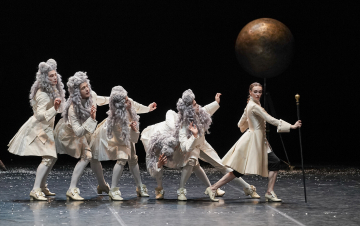Adults only
For the first time at the Bolshoi, a production is being staged by famous German choreographer Christian Spuck, who has been heading the troupe of Ballett Zürich, well noted on the world map of choreography, for almost a decade. Spuck’s productions invariably have a great impact. They receive invitations to such festivals as, for instance, Edinburgh International Festival, Dance Open in St Petersburg and DanceInversion in Moscow. They are desired as part of repertoire by the companies like Stuttgart Ballet, The Norwegian National Ballet, Les Grands Ballets Canadiens and The Stanislavski and Nemirovich-Danchenko Moscow Music Theatre.
The Bolshoi Theatre proposed to the choreographer to stage a production specifically for its company. And Mr Spuck accepted this proposal with pleasure. It is comfortable for him to come to Russia, a country of great culture, literature and the most educated and passionate ballet audiences (these are his own characteristics). In Russia too, a genre of a full-length narrative ballet is traditionally respected and Christian Spuck is drawn to it. In his collection of 'bookish' ballets, there are The Sandman and Mademoiselle de S based on the short stories by Hoffmann, Woyzeck and Leonce and Lena based on the plays by Büchner, Sonnet based on Shakespeare’s sonnets, Anna Karenina after the novel of the same name by Tolstoy…
In the foundation of the ballet, the world premiere of which will take place on the New Stage of the Bolshoi Theatre, lies a literary plot too. The choice of the source is non-trivial: it is one of the most famous, multi-layered, perhaps, strange novels, which does not however, slip away from a general reader of the feminist writings by Virginia Woolf. It is Orlando (1928). Human nature, the core of gender and creativity, are examined in the novel. An 'evasive' Russian soul is refracted through a magic crystal and in the clothes of a Russian person, there can be seen the features of cuts and colour palette of Bakst, one of the irresistible participants of the enterprise by Sergei Diaghilev, whose Russian Seasons remained in vogue in Europe all the way through the 1920s and 1930s.
“I love this novel by Virginia Woolf a lot”, says Christian Spuck, “for its irrepressible fantasy and astonishing wideness. The action unfolds over three hundred and fifty years. Woolf tells a story of a young man who does not get old and passes through the centuries as if through magical spaces, and literally “on the go”, as if there is nothing more natural than that in the world, he transforms from a man into a woman. “Orlando” gives me exactly what impresses me as a choreographer: it has a richness of volume and meaningful images. The narration feels more like a dream than a reality. There is almost weightless lightness and humour. Nevertheless, Virginia Woolf asks striking and very important questions: what is human gender? How quickly does the subjectively apprehended lifetime pass? Or how many different “selves” live in the persona of an artist? She lets the reader answer these questions. This is what I also like.”


